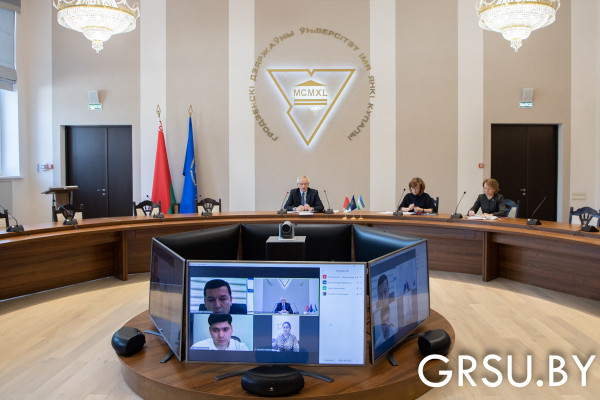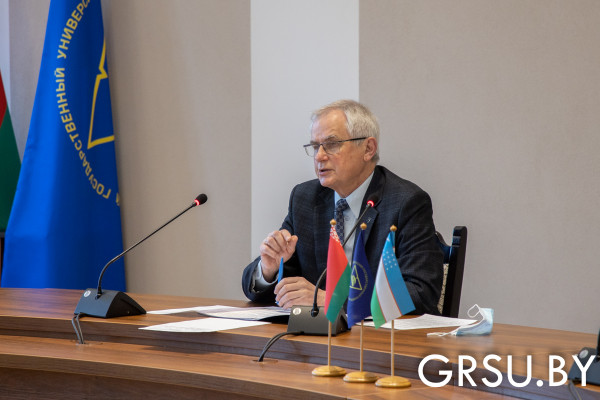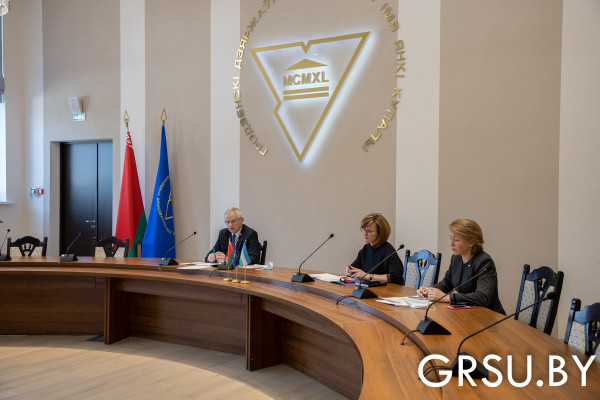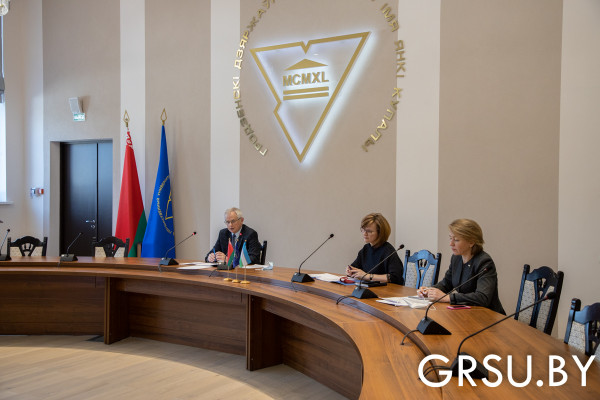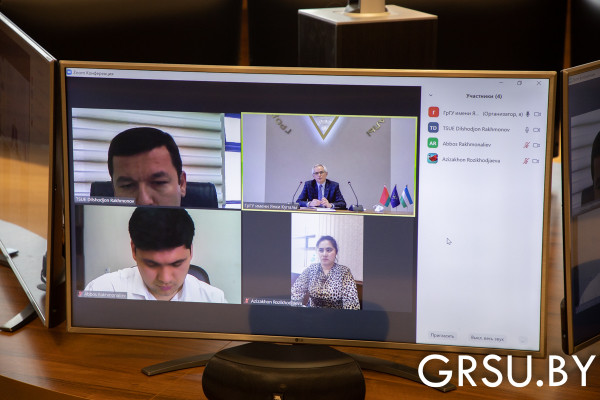
Yanka Kupala
State University of Grodno
Super User
Promising areas of cooperation with Tashkent State University of Economics were discussed at Yanka Kupala State University
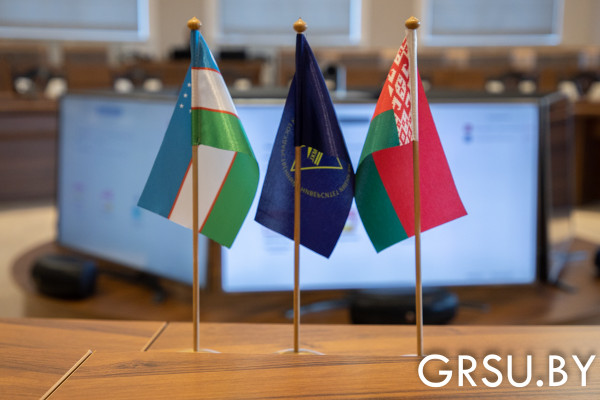
The meeting of representatives of the two universities took place online on April 26.
At the beginning of the event, Vice-Rector for Academic Affairs of Yanka Kupala State University of Grodno Yury Bialykh greeted colleagues from Uzbekistan and told about YKSUG in a presentation format. Then the main directions of international activities of Tashkent State University of Economics were presented by Vice-Rector for International Cooperation Dilshod Rakhmonov. The participants of the videoconference discussed the possibility of exchanging staff and students for undergoing study and internships, as well as for giving lectures as part of the «Visiting Professor» program. The exchange of students for training and participation in specialized summer schools was also discussed. The participants agreed to get acquainted with the curriculum in economic and tourism specialties in the near future to work out mutually beneficial areas of cooperation.
Following the results of further joint work, the representatives of both sides have planned to sign a cooperation agreement between Yanka Kupala State University of Grodno and Tashkent State University of Economics.
Reference Information: About 10 thousand students study at Tashkent State University of Economics at five faculties - economics, international tourism, corporate governance, accounting and audit, information systems in economics. Among the university employees there are 656 Professors, 10 Doctors of Science. Tashkent State University of Economics has more than 100 international agreements and actively cooperates with higher educational institutions from more than 30 countries of the world. It also conducts a joint double degree program with Turku University of Applied Sciences, Finland.
Conducted tour to the Waste Recycling Plant of Grodno
On 13 December, 2019 the local environmental initiative "URA Grodno!" together with the non-governmental association "Eco-Monitoring" organized an educational conducted tour of the Waste Recycling Plant of Grodno for young consumers to promote an environmentally friendly way of life (including the need for rational use of natural resources).
Representatives of Yanka Kupala State University of Grodno donated personal protective equipment against viral infections to doctors of Grodno
Medical masks, gowns, antiviral suits and caps were purchased and transferred to hospitals of Grodno as part of the environmental initiative "URA Grodno!"
The environmental initiative "URA Grodno!" was launched
The kick-off seminar of one of the winners of the eco-initiatives competition of the "Eco-Monitoring" project was held at Yanka Kupala State University of Grodno.
Yanka Kupala State University of Grodno held a summer methodological school of the environmental initiative "URA Grodno!"
Summer methodological school "URA Grodno!" was held by Yanka Kupala State University of Grodno supported by the Education for Sustainable Development Association. The participants, teachers of various educational institutions of the country, gathered at the farm stay «Veres» in the Zelvensky district of the Grodno region in order to improve their environmental awareness.
"URA Grodno!" is a local environmental initiative uniting thousands of people respecting nature
The environmental initiative "URA Grodno!" cooperates with educational institutions, students and their parents, representatives of local government and authorities and forms the local community through the development of environmental educational programs and the involvement of children and adults in environmental monitoring and active care of the world around them.
19 September - World cleanup day
Participants of the environmental initiative "URA Grodno!" took part in the sacrament of initiation into ecologists. On the basis of gymnasium №1 named after the academician E.F. Karsky, the school ecological organization "Ekosvet" is functioning. For the second year, gymnasium students have been studying the Green Schools program in optional classes (the program of optional classes is conducted by the «URA Grodno!» volunteers).
22nd September - World Car Free Day! The environmental initiative "URA Grodno!" actively celebrates this date
Traditional inclusive cycling quest "Give the Planet an Hour!" was held in a new format: senior cyclists conquered the locations "SDGs ", "Eco-friendship", "Sport and Health", "My Grodno", "Safe Vector", "Clean Air".
Yaroslava Sapach, a student of the Faculty of Biology and Ecology at Yanka Kupala State University of Grodno, became the winner of the republican competition "Youth Ambassadors of the Sustainable Development Goals - the future of the planet is up to us"
The competition was organized as part of the work of the Coordinating Council on Education for Sustainable Development under the Ministry of Education of the Republic of Belarus in order to popularize the 2030 Agenda for Sustainable Development, as well as the Sustainable Development Goals among youth, inform them about the mechanisms for achieving the SDGs at international, national and local levels, acquire knowledge and professional competencies of the 21st century by young people, understand and promote the ideas and principles of sustainable development.
Activities of partners of the environmental initiative "URA Grodno!" expanding the boundaries of the project "Civic engagement in environmental monitoring and improving environmental management at the local level"
Activities of partners of the environmental initiative "URA Grodno!" expanding the boundaries of the project "Civic engagement in environmental monitoring and improving environmental management at the local level", funded by the European Union and implemented by the United Nations Development Program in partnership with the Ministry of Natural Resources and Environmental Protection of the Republic of Belarus.


